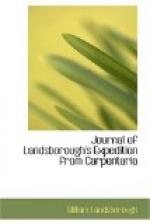I accompanied Mr. Bourne, Mr. Hennie the botanist, and two native police-troopers to the eastward in search of water. In that direction we went about six miles, which was further than was necessary as we found water within that distance. The first three miles we went was chiefly over hard flats which at high tides are covered with water; the next was over such good country that Mr. Bourne, although I had given him my account of the Plains of Promise, said he did not expect to have seen such fine country on the Albert River. The character of the country is plains with the best grasses on them. Mr. Bourne and I agreed in thinking that the lowest of them (with the exception of there being on them no cotton and cabbage saltbush) resembled in appearance, and from their having salty herbage in abundance, some parts of the Murrumbidgee plains. The higher parts are more thickly grassed and are slightly wooded with stunted timber, consisting of box, apple, white-gum, cotton, and other trees. The cotton-trees I had never seen before; but Mr. Hennie told me they had been found by Dr. Mueller when in Mr. Gregory’s party in the expedition to Northern Australia.
On this country we found abundance of waterholes, some of which were divided from each other by sandstone dykes and contained fresh, and others brackish, water. Near the waterholes, at the most conspicuous points of timber on our route, we marked trees. The north-easterly waterhole I called Mueller Lake. It is a fine long sheet of water which is brackish but not to an extent to render it undrinkable.
Before we reached any water on our way from the ship, we observed, at some distance from us, several blacks, of whom three gins and three children we overtook in their camps. These we tried to persuade by signs to lead us to the nearest water, but they were so extremely terrified that they clung to each other and would not move, except to point in the direction in which by our proceeding a short distance we found it ourselves.
On the 17th October the ship was taken alongside of the western bank of the river, and, a landing stage having been made, twenty-three of the horses were walked on shore and driven up to Frost’s Ponds; the remaining two from their being too weak were kept on board. A few of the horses after their voyage were in good order, and the most of the others, which were in such low condition from their insufficient allowance of water from Moreton Bay to Torres Strait, now showed, from their having plenty of water since their reshipment at Hardy’s Islands, that they were in a thriving state.




